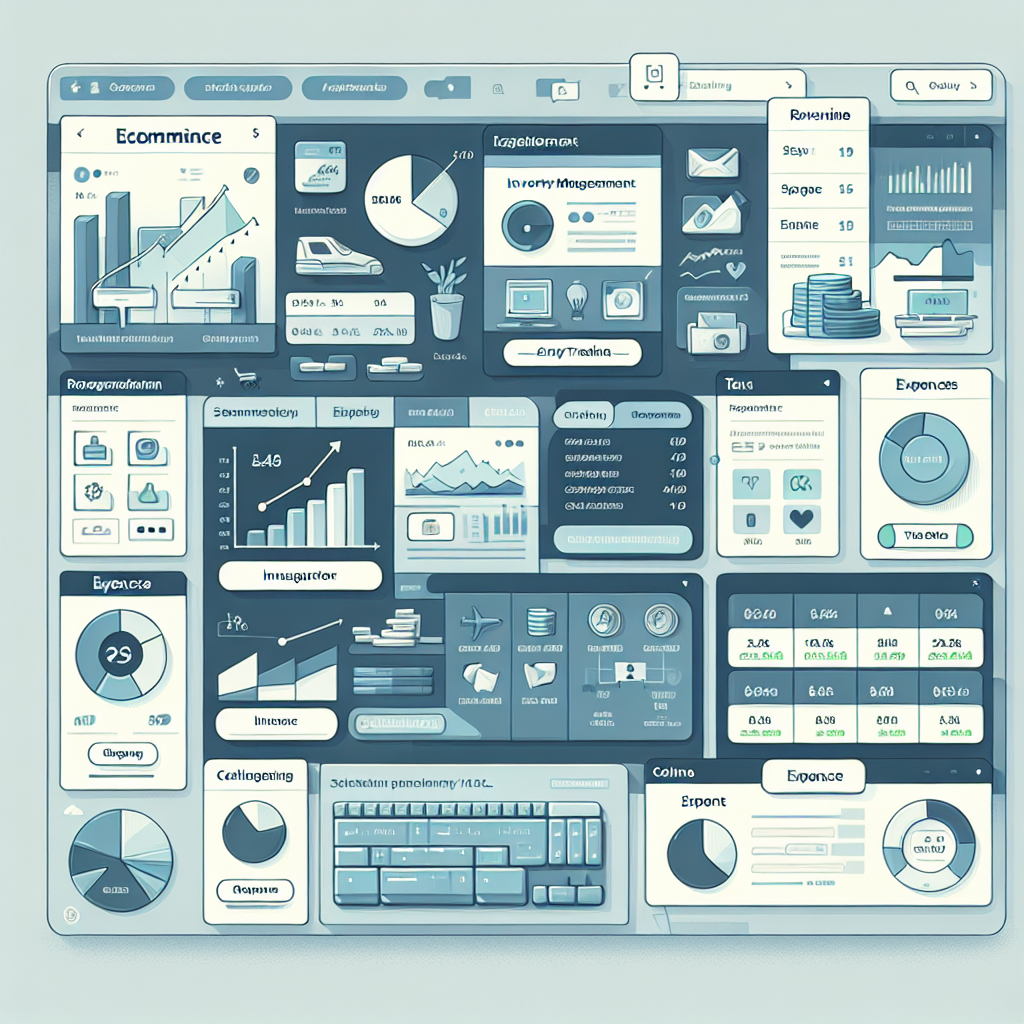10 Best Accounting Software For Ecommerce Startups and ...
Love counting cash from sales, but hate crunching numbers for tax time? Ecommerce accounting software is the solution you've been looking for. Without dedicated ecommerce accounting software, keeping up on the books can be exhausting and time-consuming. If you’re selling nationwide, tracking taxes by state might feel like a full-time job by itself. Accounting and tax mistakes can be costly, so skipping steps or rushing the process isn’t an option. The best way to speed up bookkeeping while maintaining perfect accuracy is by using a business accounting system.
Why Your Ecommerce Business Needs Accounting Software
I used to do my own bookkeeping. The worst part, I’d wait to do it until the last possible minute. On top of that, I didn’t use any software! Yes, it can be done. I would export all my transactions from my website into a google sheet, match them up to the transactions in my bank account, do the same thing for PayPal, credit cards. Yeah, an absolute nightmare. But yes, I did it. Now, I use software – and I have a bookkeeper to manage it for me. Outside of avoiding the stress dealing with accounting, there are several reasons why you should use software.
Clear Financial Reporting
Having all of your finances clearly in front of you in charts and graphs helps you visualize bookkeeping information. This clarity makes a huge difference in helping you fully understand your company’s financial statements at any given time. Get insights about individual trends and big picture perspectives at the press of a button.
Accurate Bookkeeping
No matter how good you or your bookkeeping team are at doing the math manually, humans are prone to error in a way that computers just aren’t. Integrated payment processing is more accurate in individual transactions. It is also able to screen for mistakes across informational categories to maintain the overall accuracy
Collaborate Between Departments
Making your business finances accessible to sales, marketing, payroll, inventory valuation, etc., makes it easier for everyone to work together to make the right decisions for the management of company finances.
Types of Accounting Software
Online accounting software designed for your ecommerce business allows you to customize reporting in a way that makes the most sense for your company. It also enables you to quickly skip any areas that aren’t relevant to your type of business. At the same time, it ensures that all relevant areas for your business are covered. For instance, ecommerce that operates nationally or worldwide must calculate taxes per sale per state, which can be challenging without specially-designed software. Selling different types of products requires different business licenses with additional associated costs. You want your software to understand the particular needs and potential snags of your business type.
Cloud vs. Desktop
In the early days of accounting tools, everything was based on desktop software that kept the vulnerable information off the internet. However, security on cloud networks has advanced, and more and more people put vast amounts of essential information onto cloud networks. Therefore, accounting tools have also been developed in cloud options. Cloud accounting software relies entirely on the cloud to keep all of your financial data, where you can conveniently access it from your smartphone or any computer. Desktop software keeps all of your data firmly on the desktop. If you don’t want to take any risks while having your information hacked into on a cloud, this will be the most secure choice.
What to Consider When Looking for the Best Accounting Software
There are many options to choose from, so it can be nerve-wracking to determine which small business bookkeeping tools are necessary for your company. As you compare the options, keep in mind what features your business needs and what you can do without. Be conservative in what you can afford to spend, especially when you’re getting started, but don’t compromise on the features that you need. Here are a few features to look for in quality software that may be helpful for your business.
Constant Updates to Stay Current
You want your bookkeeping software to stay current on best practices. Your software should always be evolving to utilize new tools, improve functionality, and be easier to use. Automatic software updates and easy-to-use tutorials make it convenient for you and your company to make use of every new tool as it becomes available.
Supports Multiple Users
You may only need a single license software if you just want a small accounting department to have access to your finances. However, if you have more departments that need to access the software, you need to have the capacity for many people to sign in at once.
Automated Billing, Payments, and Cash Flow
The more that your software can do for you, the less you’ll have to do yourself. Look for software that allows you to automate multiple functions if you have a company that has many repeat customers and transactions.
Inventory Management
Software that keeps track of inventory management enables you to reduce what you need to store. It also ensures that customers are never promised something that you don’t have in stock.
Sales Tax Calculation
If you are in the ecommerce business, one of the most important aspects of your accounting is sales tax compliance. Automated sales tax programs make it much easier to handle the thousands of sales tax jurisdictions throughout the United States.
Payroll, Timesheet, and Billable Hours
If you have employees, managing their time and cash flow can get exhausting. Clear, easy to understand timesheets make it easier for your personnel department and for your employees to understand their hours.
Integration with Ecommerce Platforms and Payment Processors
If you are selling things online using ecommerce platforms, an accounting package that integrates smoothly with your ecommerce selling platforms is essential. Integration with your banking system is something that all businesses find convenient.
Use on the Go
Accounting options that have highly effective accounting apps make it much easier for you to handle a lot of the important aspects of running your business on your phone. Software that also operates on a cloud enables you to access the information that you need from any computer or device that is handy.
Scalable/ Tiered Pricing
There aren’t very many business owners who hope to remain at precisely the same size in the future as they are now. You want your company to be able to grow and you don’t want to have to worry about switching to new software when it does. Plans offered at tiered pricing let you start at an affordable level and make a smooth transition to a more advanced or powerful program down the road.
Best Accounting Software for Ecommerce Businesses
When you’re just starting out with your ecommerce bookkeeping, you can’t afford to spend a lot on small business accounting tools. What better price point could there be than free? You won’t find all of the features of the more expensive options in a free plan, but you might be surprised by how much you actually can get for free. Keep in mind that to get the most from these plans, there are paid plan options available or you may pay by transaction.
Zoho Books
Zoho Books is part of the Zoho Cloud-Based Business Suite. It offers easy-to-use online accounting software. A free plan is available for businesses that earn up to $50,000 per year, with one user and one accountant. Paid plans start at $15/month billed annually.
Freshbooks
If you’re looking for an intuitive and easy-to-use accounting solution, Freshbooks might be right for your company. Paid plans start at $15/month billed annually.
Sage 50cloud
If you want a complete accounting solution for your small business, Sage 50cloud might be the right solution for you. Sage is an excellent option for ecommerce businesses with plans to grow big.
Taxjar
Calculating taxes for your ecommerce business is one of the most challenging aspects of accounting. Taxjar automatically figures out the sales tax for each state that you sell products in, so that you won’t have to calculate it manually.
Wave
Wave accounting software lets you connect as many credit card and bank accounts as you want, making it much easier to keep track of all of your finances. Income and expense tracking is easy and free.
Xero
Xero offers three plans to help you scale from small business up to mid-size and even into a larger company. Even in the more affordable plans you can still have unlimited users, so if you want great collaboration between departments, this might be the best software for your needs.
ZipBooks
ZipBooks offers a feature-packed account for free. If you decide to beef up your subscription, you can add on a payroll option, Gusto.
FreeAgent
If you don’t have products to sell but need robust software with a great app to help you manage your accounting tasks on the go, FreeAgent might be right for you.
NetSuite
NetSuite offers plans for niche businesses that set it apart from some of the other big company options. The software offers the kind of time-saving features that small business owners will love.
QuickBooks
Options start beneath $30 a month to give you all kinds of accounting solution functions like tracking income, billing, running reports, and allowing up to two accountants to access the account. Quickbooks has been the standard for a long time for good reason.
Kashoo
If simplicity in the basics is what you’re looking for, Kashoo might be the right solution for you.
Do You Still Need an Accountant?
Whether or not your business will still need an accountant depends on how much accounting you need to do and how much of it you’re comfortable handling yourself. You may decide to take care of most of your business accounting internally, but outsource your taxes to an accounting firm. Think about what you need now and how you intend to grow when choosing the right accountant. Choose the Right Accounting Software for Your Company Whether you have an ecommerce company or are running another small business, great bookkeeping is essential for your business to thrive and grow. Accounting tools that let you see insights about your business expenditures and income at a glance make it much easier for you to make decisions based on the financial data available to you.


.png)

